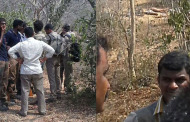Hyderabad: At least 20 red sandalwood smugglers were killed in a joint operation by the Andhra Pradesh Police and forest officials in Chittoor district of the state on Tuesday. Majority of those killed are said to be natives of Tamil Nadu.
However, none of the forest officials and policemen were injured in the incident.
According to reports, the encounter began in Seshachalam forest at around 5.00 am at two places within a radius of one km in Chandragiri mandal of Chittoor, about 500 km from Hyderabad.
Deputy Inspector General of Police Kanta Rao told reporters that a large number of red sandalwood smugglers and labourers attacked policemen with sickles and axes and pelted stones on them, forcing the officials to open fire in self defence.
The encounter started after a joint team of the Red Sanders Anti-Smuggling Task Force (RSASTF) and forest officials intercepted about 100 red sandalwood smugglers inside the forest area.
The encounter is still on and many smugglers have also sustained injuries due to heavy exchange of gunfire from both sides.
Top Andhra Pradesh officials have reached the encounter site and a massive search operation has also been launched in the areas adjoining the Chittoor forest.
On December 4, the police had seized 23 tonnes of red-sandalwood worth Rs 9 crore from smugglers.
Mumbai, Apr 07 (PTI) The rupee snapped its two-day winning run against the American currency, slipping 7 paise to close at 62.26 on fresh dollar demand from banks and importers coupled with positive global cues.
However, persistent foreign capital inflows into the equity markets restricted the rupee’s fall against dollar, a FOREX DEALER said.
The rupee resumed the day lower at 62.22 per dollar against the last closing level of 62.19 at the Interbank FOREIGN EXCHANGE (Forex) market.
CCTV (Closed circuit television) was first used in 1942 in Germany when the system was installed to observe the launch of V-2 rockets. Unlike a TV broadcast that can be viewed by anybody with an antenna, CCTV footage cannot be viewed by people outside the circuit. The recording could be transmitted through wirelines or peer-to-peer wireless communication system. The term CCTV is usually applied for a camera used for surveillance.CCTV systems became commercially available in the late 1940s.
How are modern CCTVs different from the earliest ones?
Earlier, there was no way of recording and storing CCTV information, hence most systems required constant monitoring. The development of magnetic tapes to record videos enabled CCTV systems to store footage. The reel-to-reel system, however was time consuming and extremely expensive. A reel’s storage capacity was quite low when compared to modern data storage devices and had to be changed manually. Because of these shortcomings, CCTV surveillance was not widespread. The ar rival of Video Cassette Recording technology in the 1970s made it easier to record and erase data and surveillance cameras became more common. The invention of multi plexing-a method in which multiple da ta streams could be combined, and the availability of affordable digital storage devices further helped in increasing the popularity of these cameras. Most modern CCTV networks simultaneously operate several cameras for surveillance.
When were CCTV cameras first used for crime prevention?
The first CCTV in the US was installed in 1968 in Olean, New York to monitor crime on its main business street. Subsequently, cameras were installed in Times Square in 1973. It was in the 1980s that the popularity of the CCTV network started growing and cam eras were installed in many American and British cities.
Post 911, the penetration of CCTV cameras has in creased at a steady rate. Today CCTV systems are in stalled at many places like banks, public transport system, retail shops and so on.
How much have CCTV cameras helped prevent crime?
There is disagreement among experts on this. A US department of justice study on various CCTV surveillance networks installed across the world shows mixed results. For instance, after installation of a CCTV system in Tokyo in 2002 there was a reduction in vehicle crime and a slight reduction in violence. Similarly CCTV installation in Oslo, a few streets in London, Amsterdam and so on showed a decrease in crimes like street robbery and vehicle thefts. On the other hand, east Brighton in UK and Glasgow in Scotland showed no reduction in crime. London, Beijing, Shanghai, Moscow, Chicago and so on are known for their extensive CCTV networks.
Ratan Tata has been called upon for a lot of varied things, but this might be a first for the chairman emeritus of Tata Sons. Residents of Tata Blocks, Bandra’s plush Parsi residential colony, have appealed to him for their security.
A 78-year-old retired principal secretary to a former Bombay high court chief justice was murdered in the colony on March 8. After two more crimes last week, a theft and an attempted robbery, the residents have written to the Tata trust that manages the property, asking for enhanced security. On March 31, the Bandra police also wrote to the trustees (Mumbai Mirror has a copy of the letter) demanding increased security and CCTV cameras.
Ratan Tata continues to be the chairman of all the Tata trusts. While these trusts are managed by the appointed trustees, they have to report to him from time to time.
“We have called upon Ratan Tata’s intervention because his word will be the final one,” said Soli Paymaster, 75, one of the 250-odd residents who have signed the letter sent to the trustees of the Bai Hirabai Tata Memorial Trust. Tata Blocks has over 290 flats in 25 buildings in three compounds. Nearly 70 per cent of the occupants are senior citizens.
“With such a large number of vulnerable residents, security becomes utmost important,” added Paymaster, who has lived in the colony since birth. “We understand that Ratan Tata is busy with several projects but it is time he paid some attention to us.”
Paymaster also wrote a strongly worded letter to a community newspaper, Parsi Times, terming the security issue as a “crying shame”. The colony just has one day and one night watchman. It has 10 gates and is close to three theatres, a shopping outlet and pub, and the colony is used by people for shortcuts and for parking cars. “The only security guard on duty roams around in the premises and there is no one to man the gates,” said a resident who refused to be named.
Residents got together to talk about security after two robbers murdered Darius Kapadia and fled with valuables worth over Rs 8.90 lakh on March 8. March 27, an attempted robbery and a theft were also reported from Tata Blocks. “Are they waiting for another murder to take place,” asked Nevil Dara, 43, who lives with his 78-yearold mother in one of the buildings. “I have never spotted a security guard in our colony except some times during the night. But this guard is here to look after the property and not the residents.” Another resident said: “The trustees have not bothered to visit the Tata Blocks even after the murder. This attitude is extremely bothersome.” The letter sent to the trustees by a senior inspector at the Bandra police station said one watchman is not enough for the vast residential colony’s security.
“You are aware about the increased thefts, assaults and murder of a senior citizen in the colony. As many senior citizens live there, the security needs to be strengthened,” the letter said. It also suggested that the trustees install CCTV cameras. “We have increased the patrolling in the colony. We hope you will consider out request to beef up the security,” the letter added. According to a resident, another colony under the same trust, the Tardeo Tata Colony, has extremely good security arrangements. “We pay minimal rent here,” said a Tata Blocks resident. “The residents have no issues in paying more money to get security, but the trustees have to agree for that.”
Burjor Antia, one of the trustees of the Bai Hirabai Tata Memorial Trust, confirmed getting a letter from the police to beef up security. “We will be meeting the residents of the Tata Blocks soon,” Antia told Mumbai Mirror,adding that two years ago a meeting was held to discuss security issues but nothing materialized after the residents refused to bear any additional costs. “We are completely for security,” Antia said. “Let’s see if something concrete can be worked out this time.”
NEW DELHI: The Arvind Kejriwal-led Aam Aadmi Party marked the completion of its 50 days in power in Delhi by re-launching the anti-corruption helpline number – 1031. The service can be used by people to lodge complaints if they are harassed for bribes by government official.
The helpline is a revival of the service which the AAP government had launched during its earlier 49-day stint after the 2013 Assembly elections.
“Last time our party was in power for 49 days, we had launched this helpline. We are re-launching it today,” Mr Kejriwal said while launching the helpline.
A dedicated helpline for reporting cases of corruption was one of the major promises made by AAP in its manifesto for the Assembly elections this year.
A group of volunteers has been trained to run the 24/7 helpline and attend the calls in English and Hindi. The executives will also direct the callers on how to conduct sting operations. All the calls will be divided into two categories – serious and non-serious.
RELATED
Arvind Kejriwal Plans Weekend ‘Jan Sabhas’ as AAP Attempts Damage Control
‘In 50 Days AAP Has Become a Party of VIPs’, Tweets Congress’ Ajay Maken
Delhi Chief Minister Arvind Kejriwal Addresses Attendees at the Re-Launch of AAP Government’s Anti-Corruption Helpline: Highlights
“You can complain against bribe demands by a government official or can report corruption if you have recorded audio or video evidence against an officer. Within 48 hours, a member of the anti-corruption branch will contact you and collect your evidence for further investigation,” explained a call handler on the 1031 helpline number to the Press Trust of India.
Any sting video or audio clip will be put through a forensic test during the investigation, which will be handled by the anti-corruption branch of Delhi government.
According to statistics released by AAP during its previous tenure, the helpline received over one lakh phone, most of which were against Delhi Police.
Government sources tell NDTV that with re-launch of 1031 the government will be able to cater to around 10,000 calls per day as opposed to the previous count of 1000 calls per day.
The state government has also decided to strengthen the Anti-Corruption Branch by increasing funds from Rs. 8 crore to Rs. 15 crore and inspector posts to 40.
Union minister Maneka Gandhi on Sunday expressed concern about India being the world’s largest beef exporter and claimed that the money from illegal animal slaughter was used for perpetrating acts of terrorism.
Quoting a report submitted to Uttar Pradesh Police four years ago, Gandhi, who is also a noted animal rights activist and environmentalist, claimed that the money earned through illegal animal slaughtering was going into terrorism.
It is going into terrorism, it is going into bomb making. It is going into killing us. Why we are allowing this? It is a trade of Indians. Do not blame a particular community for this,” she claimed.
“We are the largest beef exporters in the world and also killing them for leather production. We are actually killing more animals than China, it is appalling!” the minister for women and child development said during a valedictory lecture at the India for Animals conference in Jaipur.
The minister alleged that a mafia runs slaughter houses. “Take the case of Deonar slaughter house in Mumbai. They gave an undertaking in the high court that they would not export meat, which is for consumption in India. But 90% of the meat is exported. There have been hundreds of cases of stabbing and murder there. Anybody who tries to check what is actually being killed there is threatened,” she alleged. Deonar abattoir, located in the eastern suburb of Mumbai, is the largest in Asia.
Gandhi said while members of one community sell its livestock, another slaughters it in their slaughter houses and asked people not to link animal slaughter to a particular religion or community.
India is illegally exporting beef to Bangladesh and that country claims of exporting about 160,000 tonnes of beef. “But as a matter of fact they (Bangladesh) do not own a single cow,” she said.
The minister called on NGOs, volunteers and civil society to join the ‘save animals movement’ and urged them to set up informer systems to sound an alarm to prevent such trade.
“Deer’s meat is available at many places in Rajasthan, even in Dhani (hutments)…I get such information while sitting in Delhi. Every animal organ is illegally sold. Over 25,000 websites are full of illegal sale of animal organs,” she said.
On a report published during the previous UPA government’s regime stating that 80 per cent of milk in the country was “adulterated,” Gandhi lamented, “we are drinking poison”.
She asked NGOs and volunteers working for protection of animals to study the forest and wildlife acts properly and try to inform the municipal authorities about any animal cruelty.
Dissection of animals in school and college education has also stopped, she noted, adding Medical Council of India is also considering this ban.
Cosmetic research and animal experimentation needs to be contained in the growing Indian culture, the Union minister said.
The businessman, who was in an inebriated state, had allegedly in a fit of rage assaulted Chandrabose and later rammed his luxury vehicle into him over delay in opening the gate of his residential complex here on January 29. The guard succumbed to injuries on February 16
Police on Saturday filed a chargesheet in the sensational murder of a 51-year-old security guard allegedly by beedi tycoon Mohammed Nisham at the Judicial First Class Magistrate court at nearby Kunnamkulam. The chargesheet contained scientific evidences and other documents to prove the charges, including murder, against Nisham, police said.
Statements of 12 eyewitnesses, including Nisham’s wife Amal, had been been recorded under section 164 of the Code of Criminal Procedure. Besides, statements of over 100 witnesses had also been recorded and attached with the chargesheet. Police said they also have plans to move court for a speedy trial.
KOLHAPUR, APR 4:
In yet another trial room snooping case, a worker of Fabindia store in Kolhapur in Maharshtra has been arrested for allegedly filming a woman customer using his mobile phone, police said today.
The incident, which took place on March 31 in the premium ethnic clothing brand’s outlet in Tarabai Park area here in south Maharashtra, came to light after Union HRD Minister Smriti Irani made an issue of the trial room snooping in Fabindia’s store in Candolim at Goa.
The worker, Prakash Ananda Ispurle, was arrested on April 1 after the woman filed a police complaint, and was sent to judicial custody where he is currently lodged, police said.
The woman was trying clothes when Ispurle placed his mobile phone in recording mode in the gap between the trial room door and the floor, police said.
When she noticed the phone, she raised an alarm. Ispurle quickly pulled out the mobile phone and hurriedly went to a corner of the store and deleted the recording, they said.
During investigation, police spotted Ispurle in the CCTV footage filming the woman.
Srinagar/Doda, Apr 4 (PTI) Three more bodies were recovered today from debris of the houses that collapsed in landslides caused due to incessant rains in Jammu and Kashmir, officials said.
With the recovery of the bodies, toll in two separate incidents of mudslide has increased to 20.
Search and rescue workers retrieved the body of seven- year-old boy Ahmad Hajam from the debris of a house at village Laden in Chadoora tehsil this morning, a police official said, with this toll increased to 16.
Laden village witnessed landslide caused by heavy rains on intervening night of Sunday and Monday. Rescue parties immediately swung into action and recovered 15 bodies of two families from the debris of the house swallowed by earth. The boy had remained untraced.
The operation ended with the recovery of the body of the missing boy from the debris, the official said.
Meanwhile, two more bodies were recovered today from the debris of the collapsed house, which was yesterday hit by a massive landslide triggered by incessant rains in Doda district. Three persons were still missing.
“Rescuers today recovered two more bodies from the debris of the house that collapsed under a massive landslide in Diwalkund in Dessa belt of Doda district yesterday,” Senior Superintendent of Police Doda, Javed Naseeb Manhas told PTI.
With the recovery of two more bodies, he said, the total bodies recovered since yesterday has risen to four.
“Two bodies were recovered yesterday. Three people who are also feared dead, continue to be trapped under the debris of the house which has come under around 18 feet of mud and slush,” he said, adding a joint rescue operation by Police, Army and civil administration was under way.
“Continuous rainfall has been creating hurdles in the operation as the area is prone to more landslides. It is a remote area which lacks road accessibility thus making the movement of heavy machinery impossible”, he said.
The house of one Jodh Ram had collapsed yesterday after being hit by a massive landslide burying the debris under more than 18 feet of mud and slush.
Chennai, Apr 4 (PTI) An assistant professor of Annamalai University at Chidambaram is among six persons arrested in connection with theft of answer sheets in the varsity.
C Bhaskaran, an Assistant Professor of History and five others, all office attendants, were arrested on Thursday on a complaint from the university after it was noticed in February that answer papers were missing from the varsity’s strong room.
The gang allegedly retrieved the papers from the strong room using duplicate keys and handed them over to students to rewrite correct answers in return for money, police said.
A probe is on to ascertain if more persons were involved in this matter, police said.
















Recent Comments